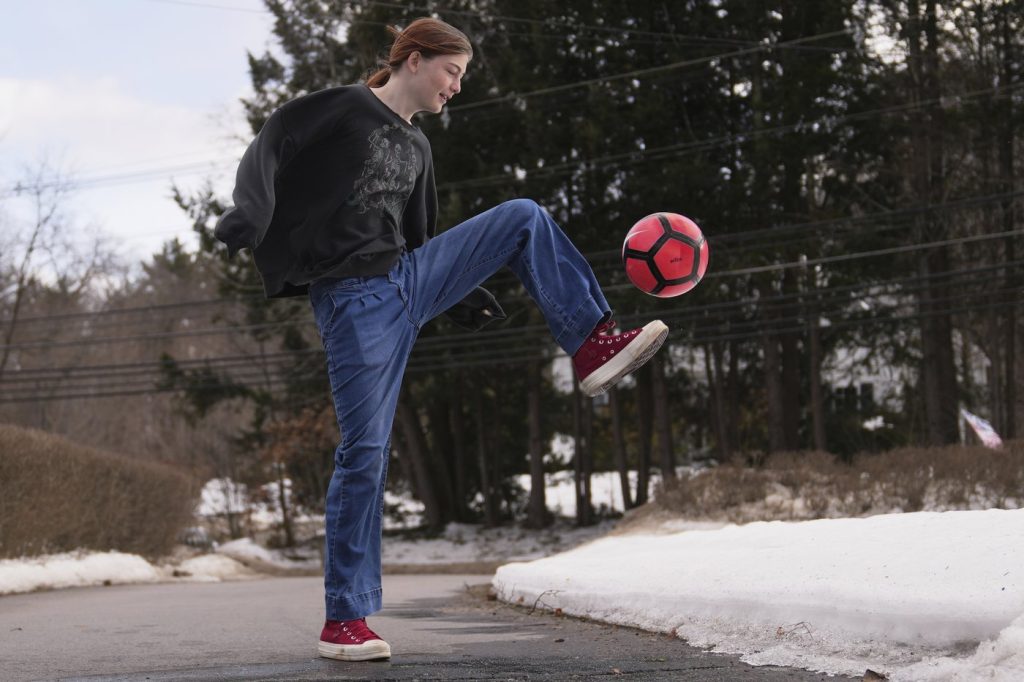CONCORD, N.H. (AP) — Parker Tirrell, a 16-year-old transgender athlete, enjoys various activities such as art classes, browsing TikTok, and working at a local pet store, but her true passion lies in playing soccer. Having participated in the sport since the age of four, Tirrell felt accepted on her team until her circumstances changed last year due to legislative actions against transgender girls participating in girls' sports.
The challenges began with a state ban imposed on transgender girls in Girls’ sports, followed by President Donald Trump’s executive order on February 5, 2025, titled “Keeping Men Out of Women’s Sports.” These developments drastically altered the landscape of her athletic participation, leaving Tirrell feeling singled out by the lawmakers and the political system. “I just feel like I’m being singled out right now by lawmakers and Trump and just the whole legislative system for something that I can’t control,” she expressed during an interview with the Associated Press.
Parker Tirrell and her peer, Iris Turmelle, 15, are pioneers in challenging this executive order and had previously sued their own state regarding its ban on transgender athletes. They secured a court order permitting them to continue playing, which signifies their resilience amidst adversity. Turmelle articulates the stress and difficulties faced due to laws targeting their identity, emphasizing their shared humanity: “We don’t go to sleep in the day and go out at night and drink people’s blood. We don’t hate sunlight. We’re human, just like you.”
Supporters of the ban, including Trump and others, argue that it promotes fairness and safety in girls' sports. The topic has garnered support across the U.S., with recent surveys indicating a significant number of voters feeling that support for transgender rights has been excessive, amidst growing concerns on a national level. About half of all U.S. states have enacted similar bans, and even some Democratic leaders, such as California Governor Gavin Newsom, have voiced opposition to allowing transgender girls to play in girls’ teams.
Trump's executive order expands the federal government’s powers in ensuring compliance with Title IX, the legislation prohibiting sexual discrimination in educational institutions. The administration perceives "sex" as aligned with one's gender assigned at birth, which they argue is essential to maintaining fairness in competitive environments. The approach has prompted legal challenges in several states, with a handful seeking Supreme Court reviews regarding the enforcement of laws limiting transgender athletes’ participation.
Groups like Female Athletes United have taken steps to intervene in Tirrell and Turmelle’s lawsuit, asserting their interests in maintaining a competitive balance in sports. They express concerns that coexistence with transgender athletes undermines the fairness of women's sports. In response, both Tirrell and Turmelle refute claims regarding their perceived unfair advantage. Tirrell points out her physical differences compared to her peers, while Turmelle recalls her unsuccessful attempt to join the softball team, signaling that competitiveness extends beyond gender identity.
Amidst legislative battles, both teens continue to navigate their teenage years while advocating for their rights. They have actively testified against bills that would restrict access to hormone treatments and puberty blockers for transgender youth. Tirrell recently conveyed her experiences of receiving supportive messages from peers, reinforcing her sense of belonging despite societal negativity.
Turmelle, engaged in various hobbies, hopes to participate in tennis, affirming her desire for acceptance through sports. The incidents surrounding their advocacy highlight not only their determination but also the broader implications of legislation on the lives of transgender adolescents. The struggle for equality in sports remains a focal point for their advocacy, illustrating the emotional and social toll placed on young athletes aiming to partake in the activities they love.










